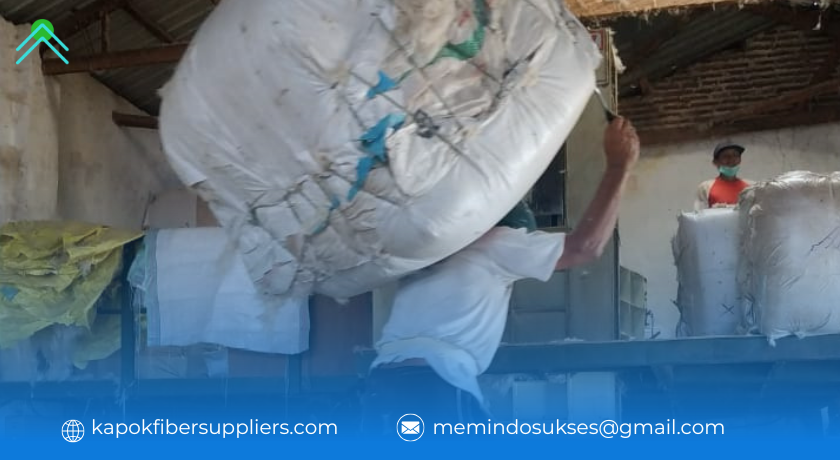
In today’s rapidly evolving global market, businesses are increasingly looking for ways to innovate while minimizing their environmental footprint. One material that has gained significant attention for its eco-friendly properties is kapok fiber. Derived from the Ceiba pentandra tree, kapok fiber is a lightweight, natural, and biodegradable material with a wide range of applications across industries. This article highlights the growing importance of kapok fiber export, and explains how CV. Media Mitra Indonesia (Memindo) is becoming a key player in meeting the global demand for this sustainable resource.
What is Kapok Fiber?
Kapok fiber is a natural fiber harvested from the seed pods of the kapok tree, which is found in tropical regions. The fiber is soft, fluffy, and highly buoyant, with unique properties that make it an attractive alternative to synthetic materials. Traditionally, kapok fiber has been used in pillows, mattresses, and cushions due to its lightness and comfort. However, its versatility and eco-friendly nature are now making it a sought-after material in industries such as textiles, automotive, construction, and more.
Why Kapok Fiber is Gaining Popularity
- Biodegradable and Environmentally FriendlyIn an era when environmental consciousness is paramount, kapok fiber stands out as a biodegradable material that can help reduce plastic waste and other synthetic fibers’ harmful environmental impact. Unlike synthetic options that persist in landfills for decades, kapok naturally decomposes without leaving harmful residues, making it an attractive choice for manufacturers focused on sustainability.
- Lightweight and DurableKapok fiber is incredibly lightweight, which makes it a popular option for industries that require low-weight materials without compromising on durability. Its resilience and ability to maintain its shape make it an ideal filling material for a variety of products, such as eco-friendly cushions, insulation, and even in the production of lightweight automotive components.
- Water-Resistant and HypoallergenicKapok is naturally resistant to moisture and mold, making it an excellent choice for applications in humid or damp environments. This property is particularly valuable in outdoor gear, marine applications, and textiles. Additionally, kapok is hypoallergenic, making it suitable for sensitive skin, especially in products like bedding, pillows, and baby items.
The Global Market for Kapok Fiber
As global industries move toward more sustainable practices, the demand for natural, eco-friendly materials like kapok fiber continues to grow. Kapok is being used not only in traditional applications but also in emerging industries such as automotive manufacturing, biodegradable packaging, and construction materials.
In the textile industry, kapok fiber is gaining popularity as a filling for pillows, mattresses, and furniture upholstery. It provides a sustainable alternative to synthetic filling materials like polyester, which take longer to decompose and can negatively impact the environment. Similarly, in automotive manufacturing, kapok’s lightweight properties make it an ideal material for composite components and insulation, helping to reduce the overall weight of vehicles and improve fuel efficiency.
The construction sector is also discovering the advantages of kapok fiber. As demand for energy-efficient and eco-friendly buildings grows, kapok is being used as an insulation material due to its natural ability to trap air and reduce energy loss.
Indonesia’s Role as a Leading Kapok Fiber Producer
Indonesia, with its vast tropical forests, is one of the world’s leading producers of kapok fiber. The country has an abundance of Ceiba pentandra trees, making it ideally positioned to meet the global demand for this sustainable material. Indonesian farmers and producers have honed their skills in harvesting and processing kapok fiber, ensuring a high-quality product that meets international standards.
Indonesia’s strong position as a key supplier of kapok fiber presents a significant opportunity for businesses worldwide to access this renewable resource. Companies looking to incorporate kapok into their products can rely on Indonesia’s rich natural resources and established expertise to ensure a consistent and reliable supply.
Why Choose CV. Media Mitra Indonesia (Memindo) for Kapok Fiber Export?
For businesses looking to import high-quality kapok fiber, CV. Media Mitra Indonesia (Memindo) is the ideal partner. Here are some reasons why Memindo stands out as a trusted supplier:
- High-Quality Kapok FiberMemindo ensures that its kapok fiber meets the highest standards of quality, providing a product that is clean, lightweight, and durable. Their fiber is processed using state-of-the-art techniques to ensure consistency and optimal performance for a wide range of applications.
- Commitment to SustainabilityAt Memindo, sustainability is a core value. The company is committed to eco-friendly sourcing and production practices, ensuring that all kapok fiber is harvested and processed responsibly. By choosing Memindo, businesses can confidently integrate sustainable materials into their products, contributing to a greener future.
- Customized SolutionsCV. Media Mitra Indonesia (Memindo) understands that different industries have different requirements. Whether you need raw fiber, processed fiber, or specialized products for unique applications, Memindo offers tailored solutions to meet your specific needs. This flexibility allows them to serve a wide variety of industries, including textiles, automotive, construction, and more.
- Efficient Export ServicesWith years of experience in international trade, Memindo is well-equipped to handle global logistics and export procedures. The company ensures timely delivery of orders, meeting the requirements of clients worldwide. Memindo’s efficient export services help businesses avoid delays and get the products they need without hassle.
The Future of Kapok Fiber in Global Trade
The future of kapok fiber looks incredibly promising. As demand for eco-friendly materials continues to rise, kapok is set to become an even more important resource for industries worldwide. From textiles to automotive to construction, kapok offers unmatched versatility and sustainability, making it a key material for the green economy.
Indonesia’s strong position as a top producer of kapok fiber, combined with CV. Media Mitra Indonesia (Memindo)’s dedication to quality and sustainability, ensures that the global market will continue to have reliable access to this valuable resource. As more industries recognize the environmental and practical benefits of kapok, its role in global trade will only expand.

